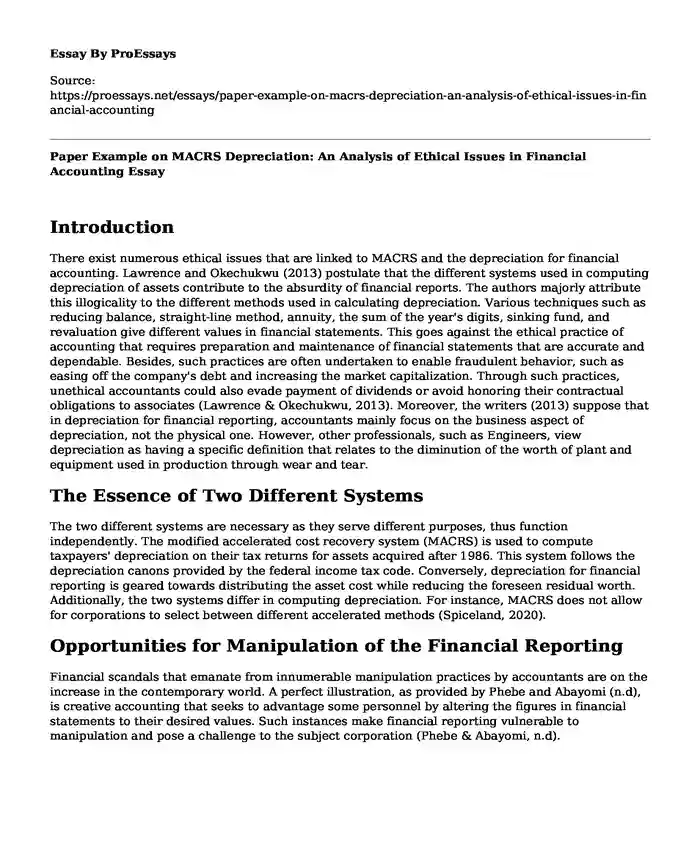Introduction
There exist numerous ethical issues that are linked to MACRS and the depreciation for financial accounting. Lawrence and Okechukwu (2013) postulate that the different systems used in computing depreciation of assets contribute to the absurdity of financial reports. The authors majorly attribute this illogicality to the different methods used in calculating depreciation. Various techniques such as reducing balance, straight-line method, annuity, the sum of the year's digits, sinking fund, and revaluation give different values in financial statements. This goes against the ethical practice of accounting that requires preparation and maintenance of financial statements that are accurate and dependable. Besides, such practices are often undertaken to enable fraudulent behavior, such as easing off the company's debt and increasing the market capitalization. Through such practices, unethical accountants could also evade payment of dividends or avoid honoring their contractual obligations to associates (Lawrence & Okechukwu, 2013). Moreover, the writers (2013) suppose that in depreciation for financial reporting, accountants mainly focus on the business aspect of depreciation, not the physical one. However, other professionals, such as Engineers, view depreciation as having a specific definition that relates to the diminution of the worth of plant and equipment used in production through wear and tear.
The Essence of Two Different Systems
The two different systems are necessary as they serve different purposes, thus function independently. The modified accelerated cost recovery system (MACRS) is used to compute taxpayers' depreciation on their tax returns for assets acquired after 1986. This system follows the depreciation canons provided by the federal income tax code. Conversely, depreciation for financial reporting is geared towards distributing the asset cost while reducing the foreseen residual worth. Additionally, the two systems differ in computing depreciation. For instance, MACRS does not allow for corporations to select between different accelerated methods (Spiceland, 2020).
Opportunities for Manipulation of the Financial Reporting
Financial scandals that emanate from innumerable manipulation practices by accountants are on the increase in the contemporary world. A perfect illustration, as provided by Phebe and Abayomi (n.d), is creative accounting that seeks to advantage some personnel by altering the figures in financial statements to their desired values. Such instances make financial reporting vulnerable to manipulation and pose a challenge to the subject corporation (Phebe & Abayomi, n.d).
References
Lawrence, O. A. & Okechukwu U. A. (2013). Review of Accounting Gimmicks Called Depreciation. Open Journal of Accounting. Vol. 2 pp. 39-44.
Phebe, F. T. & Abayomi, A. A. (n.d). Ethical Issues on Creative Accounting: Theoretical and Practical Perspectives. Retrieved July 3, 2020 From: https://www.iuiu.ac.ug/journaladmin/iumj/ArticleFiles/95350.pdf
Spiceland, D. (2020). Intermediate Accounting. [ECPI]. Retrieved July 3, 2020 From: https://ecpi.vitalsource.com/#/books/9781260481976/
Cite this page
Paper Example on MACRS Depreciation: An Analysis of Ethical Issues in Financial Accounting. (2023, Sep 23). Retrieved from https://proessays.net/essays/paper-example-on-macrs-depreciation-an-analysis-of-ethical-issues-in-financial-accounting
If you are the original author of this essay and no longer wish to have it published on the ProEssays website, please click below to request its removal:
- Research Paper on Academic Excellence of the African Americans Studying in the USA
- The Indentured Generation and How Debt Stunts Young People's Dream
- What Can Be Done to Improve the College Graduation Rate? Essay
- Paper Example on Monogamy, Polygamy, and Polyandry
- Essay Sample on Rights and Responsibilities of Employees
- Essay Sample on Interpersonal Communication: Inescapable, Irreversible, Complicated & Contextual
- Essay Example on Interpersonal Theory: Sullivan







